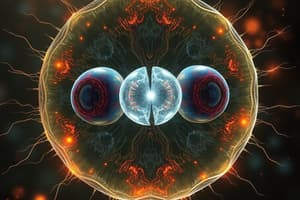Podcast
Questions and Answers
What happens during the prophase stage of mitosis?
What happens during the prophase stage of mitosis?
- The nuclear membrane breaks down. (correct)
- Chromatids are pulled to opposite poles of the cell.
- Chromosomes line up along the middle of the cell.
- The chromatic structure becomes invisible.
Which process requires energy to transport molecules across the cell membrane?
Which process requires energy to transport molecules across the cell membrane?
- Diffusion
- Osmosis
- Active transport (correct)
- Facilitated diffusion
What are the end products of protein digestion?
What are the end products of protein digestion?
- Glucose molecules
- Fatty acids
- Monosaccharides
- Amino acids (correct)
What is the primary characteristic of the daughter cells produced by mitosis?
What is the primary characteristic of the daughter cells produced by mitosis?
What defines osmosis in biological terms?
What defines osmosis in biological terms?
During which phase of mitosis do chromosomes align at the cell's equator?
During which phase of mitosis do chromosomes align at the cell's equator?
What is the ultimate purpose of digestion in humans?
What is the ultimate purpose of digestion in humans?
What is produced after the digestion and absorption of small subunits?
What is produced after the digestion and absorption of small subunits?
What defines a diploid cell?
What defines a diploid cell?
What type of transport does NOT require energy?
What type of transport does NOT require energy?
Flashcards
Interphase
Interphase
The phase where the cell spends most of its time, growing and preparing for division.
Mitosis
Mitosis
The process of cell division that produces two genetically identical daughter cells from a single parent cell.
Prophase
Prophase
The stage where chromosomes condense and become visible, and the nuclear membrane breaks down.
Metaphase
Metaphase
Signup and view all the flashcards
Anaphase
Anaphase
Signup and view all the flashcards
Cytokinesis
Cytokinesis
Signup and view all the flashcards
Active Transport
Active Transport
Signup and view all the flashcards
Osmosis
Osmosis
Signup and view all the flashcards
Enzymes
Enzymes
Signup and view all the flashcards
Digestion
Digestion
Signup and view all the flashcards
Study Notes
Mitosis Stages
- Interphase: Chromosomes become visible; DNA already copied.
- Prophase: Each chromosome consists of two chromatids; nuclear membrane breaks down.
- Metaphase: Chromosomes line up in the center of the cell.
- Anaphase: Chromatids separate, moving to opposite poles of the cell; each chromatid is now called a chromosome.
- Cytokinesis: Cell splits into two.
Mitosis Overview
- Mitosis is cell division in body cells (not gametes).
- It produces two identical diploid daughter cells.
- Daughter cells have the same genetic makeup as the parent cell.
Active Transport
- Cells sometimes move molecules against their concentration gradient or transport large molecules through membranes.
- This is called active transport, using transport proteins in cell membranes.
- Active transport requires energy.
- Passive processes like osmosis and diffusion do not require energy.
Osmosis
- Water moves from areas of high concentration to low concentration through a semi-permeable membrane.
- Example: Potato experiment.
Enzymes
- In humans, digestive enzymes break down large food molecules into smaller subunits.
- Digested molecules are absorbed by the small intestine.
Types of Enzymes and Digestion
- Starch breakdown produces glucose molecules.
- Protein breakdown produces amino acids.
- Lipid breakdown produces fatty acids.
Post-Digestion Synthesis
- Absorbed small molecules build larger molecules in cells and tissues.
- This process is called synthesis.
- Complex carbohydrates and proteins are polymers, made from smaller monomers.
Studying That Suits You
Use AI to generate personalized quizzes and flashcards to suit your learning preferences.




